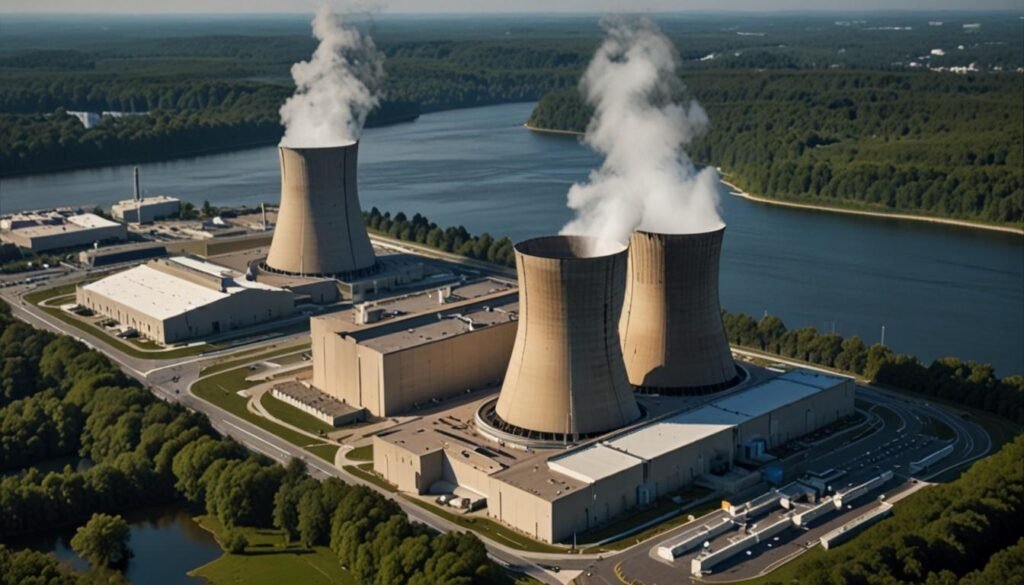Constellation Energy seeks a $1.6 billion federal loan guarantee to restart the notorious Three Mile Island nuclear plant, aiming to power Microsoft’s data centres with zero-emissions energy.
Constellation Energy Pursues Ambitious Plan to Reopen Three Mile Island
Constellation Energy, owner of the once-defunct Three Mile Island nuclear plant, is pursuing a $1.6 billion federal loan guarantee to finance a plan to restart operations at the Pennsylvania facility. The proposed restart aims to supply electricity solely to technology giant Microsoft, which plans to use the power to support its expansive data centre operations across the United States, according to information shared with The Washington Post.
The integration of nuclear energy into tech infrastructure is a venture that aligns with Microsoft’s commitment to sourcing zero-emissions power. This step is part of a broader strategy to dominate the field of artificial intelligence, a pursuit that requires massive energy resources.
The proposition to reboot Three Mile Island has garnered support from political figures including Pennsylvania Governor Josh Shapiro. However, it also holds a controversial edge, primarily due to its historical significance as the site of the United States’ worst nuclear incident in 1979. The reactor in question was closed in 2019, two decades after the infamous partial meltdown of a nearby unit in 1979.
The bid for a federal loan guarantee, which Constellation submitted to the U.S. Energy Department in May, has progressed past initial reviews. This stage typically leads to negotiations regarding the terms of the potential deal. Such a guarantee serves to alleviate financial risk, shifting it to taxpayers, as it promises to cover up to $1.6 billion should there be a default. Lower borrowing costs, estimated up to $122 million for Constellation, could be a significant advantage.
John Parsons, an energy economist at the Massachusetts Institute of Technology, emphasises that these guarantees usually advocate for more favourable borrowing terms, accompanying federal tax credits from the Inflation Reduction Act of 2022. These credits could bring in nearly $200 million annually for Constellation and Microsoft.
While both the Energy Department and Microsoft have remained largely tight-lipped regarding the specifics of the loan guarantee application, Constellation has acknowledged the discourse, stressing that taxpayer risk remains minimal. The company’s statement asserts their financial security, backed by an $80-billion valuation.
The loan guarantee could be directly drawn from the U.S. Treasury by applicants, a detail that remains undisclosed in Constellation’s approach. Constellation and Microsoft have already inked a deal, contingent on regulatory approval, to purchase all power from the revived unit, with plans to launch the facility by 2028. The collaboration spans a 20-year contract, although financial specifics remain under wraps.
Historically, nuclear plant projects have faced significant delays and budget overruns, evident in the recent example of reactors in Augusta, Georgia, which were both seven years delayed and $17 billion over budget. Constellation expresses confidence in avoiding these pitfalls, emphasizing that they aim to restart an existing unit.
Parallel to Three Mile Island’s potential reopening, a similar project is underway at the Palisades nuclear facility in Michigan. A $1.52 million loan guarantee was recently secured for the plant, which remains shut since 2022. Safety inspections by the Nuclear Regulatory Commission will be decisive for both facilities, with potential hurdles including the need for bespoke components possibly impacting timelines.
The widest implications suggest that Three Mile Island, if restarted, would power over 800,000 homes with clean energy, feeding into a power grid encompassing 13 states and Washington D.C. The innovative partnership with Microsoft reflects broader trends among tech companies using creative accounting to attribute low-emissions energy to their operations, even as they draw power from various sources.
Critics voice concerns over Constellation’s optimistic forecast regarding the swift and cost-effective revival of Three Mile Island. Evan Caron, co-founder of Montauk Climate, notes potential risks and market misalignments within the project’s speculative framework. He projects a low probability for meeting the 2028 deadline, but Constellation remains steadfast, suggesting a potential 2027 reopening.
In the realm of energy supply, the Baltimore-based Constellation Energy stands as a key player, operating 15 nuclear power plants and positioning itself as a provider of 10% of the nation’s clean energy. Its post-2008 financial resilience marks its continued influence within the energy landscape.
Source: Noah Wire Services


